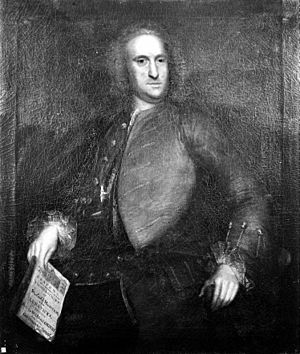William Battie facts for kids
William Battie (born September 1, 1703 – died June 13, 1776) was an English doctor. He wrote an important book in 1758 called A Treatise on Madness. This book was one of the first long books about how to help people with mental health challenges. He also made sure that both rich and poor people could get help. Because of his work, helping people with mental health issues became a respected part of medicine, known today as psychiatry. He was even the President of the Royal College of Physicians in 1764.
About William Battie
William Battie was born in 1703 or 1704 in a place called Modbury, in Devon, England. His father was a vicar, which is a type of church leader. William went to school at Eton College and then studied at King's College, Cambridge.
He wanted to become a lawyer, but he couldn't afford the training. So, he decided to study medicine instead. He worked as a doctor for a short time in Cambridge. Later, he moved to London and spent many years helping people with mental health challenges. He even owned two private hospitals, sometimes called "madhouses" back then, which were near St Luke's Hospital for Lunatics. These hospitals helped him earn a good living.
His career really took off when he became the main doctor at St. Luke's Hospital. This job helped him become very well-known and respected. In January 1742, he was chosen to be a Fellow of the Royal Society, which is a group of important scientists. In 1764, he made history by becoming the first and only psychiatrist to be the President of the Royal College of Physicians.
William Battie passed away in 1776 after having a stroke. He was buried next to his wife in Kingston, Surrey.
His Work in Mental Healthcare
Soon after he started working at St. Luke's Hospital, Battie began talking about new ways to help people with mental health issues. He wrote his famous book, Treatise on Madness, in 1758. In this book, he strongly criticized the old ways of treating patients, especially at the Bethlem Hospital. At Bethlem, patients were often kept in crowded rooms, treated harshly, and even had visitors who would make fun of them.
Battie believed in a much kinder approach. He argued that patients should be treated with cleanliness, good food, fresh air, and support from friends and family. He thought that mental health challenges might come from the brain and body not working correctly, rather than just being about a person's thoughts. He suggested medical treatments that were common at the time.
It wasn't until 1796, when the York Retreat was opened, that a much more humane and understanding way of treating mental health was widely used in England.
Battie's book caused a debate with another doctor named John Monro, who worked at Bethlem Hospital. Monro felt that Battie's book was an attack on his family and his hospital. This disagreement is sometimes called the first big debate in the field of psychiatry.
William Battie strongly believed that mental health challenges could be treated. He wrote:
"Madness is ... as manageable as many other distempers, which are equally dreadful and obstinate, and yet are not looked upon as incurable; such unhappy objects ought by no means to be abandoned, much less shut up in loathsome prisons as criminals or nuisances to society".
He meant that mental health issues are like other illnesses that can be difficult but are not impossible to treat. He felt that people facing these challenges should never be given up on or locked away like criminals.
 | DeHart Hubbard |
 | Wilma Rudolph |
 | Jesse Owens |
 | Jackie Joyner-Kersee |
 | Major Taylor |


